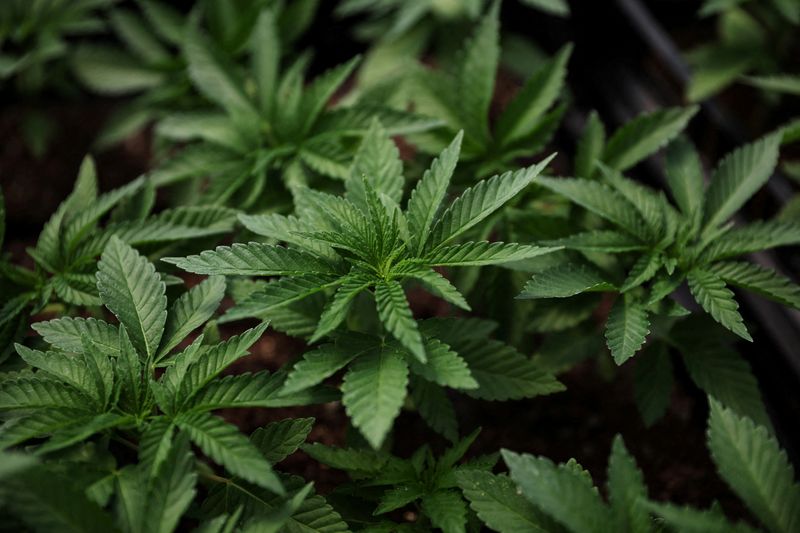By Timothy Aeppel
(Reuters) -Workers at Wyatt Bassett's furniture factory in Virginia use powerful tools to churn out the company's trademark dressers and headboards, so screening new hires for drugs is a no-brainer.
Or it used to be.
Virginia last year fully legalized marijuana — the first state in the South to do so. The upshot is that "being positive for cannabis does not necessarily disqualify you for employment," said Bassett, CEO of Vaughan-Bassett Furniture Co., which has 575 employees.
On Thursday, President Joe Biden issued an executive order aimed at reshaping how the federal government treats cannabis.
The shift in policy should aid many companies. Faced with a shortfall in applicants, employers across the U.S. are balancing pressure to ease up on testing for a legal drug with concerns that this could impact safety and raise issues of liability.
The U.S. jobless rate ticked up to 3.7% last month, but it remains near a five-decade low.
"With the war for talent and the labor shortage, especially in some lower paying jobs, it's tough to find and retain folks — so many are deciding to not test, except for safety sensitive jobs," said Julie Schweber, a senior knowledge adviser at the Society for Human Resource Management. Companies with multiple operations in different parts of the country face an added challenge, she said, because laws differ from state to state.
Biden's order on Thursday grants a pardon for all prior federal offenses of simple marijuana possession. He also announced a review of how cannabis is "scheduled," or classified, under federal law. The current schedule places it in the same class as heroin and LSD and in a higher classification than fentanyl and methamphetamine.
The challenge of balancing workplace safety and the growing prevalence — and legalization — of some types of drugs is especially acute for manufacturers and others who use dangerous equipment.
Last June, Amazon.com Inc (NASDAQ:AMZN). said positive tests for marijuana use would no longer disqualify people from jobs that are not regulated by the U.S. Department of Transportation, such as truck drivers.
The e-commerce giant — like many other employers — said it will treat cannabis like alcohol, even though traces of its use linger in the human body far longer and can show up on some types of tests after a worker is no longer impaired by its use. "We will continue to do impairment checks on the job and will test for all drugs and alcohol after any incident," wrote former-CEO Dave Clark, in a blog post at the time of the announcement.
Data from Quest Diagnostics (NYSE:DGX), which handles testing for companies, shows a steady increase in positivity rates for marijuana tests over the past decade — coinciding with the wave of legalization. In 2012, only 1.9% of workers not subject to federally mandated drug testing requirements failed a pre-employment screening. Last year, that had grown to 4.1%. The jump in positive tests after accidents grew even more during that period, up from 2.4% to 6.7%.
The majority of Fortune 1000 companies have some type of screening in place, but many companies are dropping cannabis tests from the list, said Barry Sample, a senior science consultant who compiles Quest's data. Still, Quest estimates between 30 to 35 million employment-related drug tests are conducted in the U.S. annually.
Most of the tests Quest conducts use urine samples. Other tests rely on swabbing saliva or hair samples. "None of this testing can say whether someone is impaired," said Sample. Rather, the tests will simply indicate the presence of the drug based on a pre-set threshold.
Cannabis use for medical reasons is now legal in 37 states, while recreational use is legal in 19. Quest's data also shows that states that allow recreational use of cannabis have higher positivity rates.
Sample said many employers are shifting screening efforts to focus on drugs that remain illegal and where use in some industries also appears on the upswing. In manufacturing, for instance, Quest found the positivity rate clicked up last year for both methamphetamine and cocaine.
Insurance experts say it is too early to see if the changes will drive up insurance rates for companies that drop testing. "Nobody is going to come out and say, 'We're increasing premiums because you have more stoned workers on the job,'" said Mark Pew, a consultant who specializes in workers' compensation insurance in Georgia. But if, over time, companies that have looser drug screening policies have higher accident rates than those who stick to tougher rules, that could change, he said.
Matt Zender, a senior vice president for workers' compensation strategy with AmTrust Financial Services Inc., said one factor that may obscure or offset the impact of more drug use on the job is the general move toward safer workplaces.
"If you just look at claims per 100 hours of work, overall people are getting injured less often than they were in the past," he said.
Meanwhile, companies continue to fine tune their approaches on the issue. A California manufacturer of plastic bags, contacted by Reuters about their drug screening policies, was surprised to learn that his human resources department was automatically rejecting applicants who test positive for cannabis.
"My nephew would never get a job if I enforced that on him," Kevin Kelly, CEO of Emerald Packaging (NYSE:PKG) Inc. in Union City, Calif., said in an email. He said he had now directed his hiring managers to drop the requirement, adding that workers at the factory are not allowed to be impaired on the job. Cannabis use is fully legal in California.
